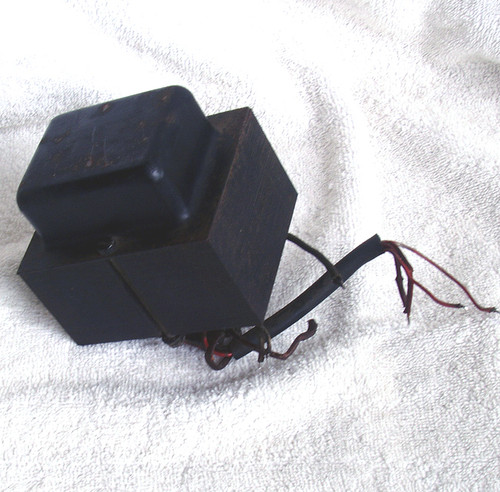Salvaged from a "grand-daddy" valve oscilloscope which a Taylor Model 31A
Taylor Electrical Instruments were a designer & manufacturer of test equipment in England
The company was purchased by AVO in 1958 and eventually AVO (which was purchased by Metal Industries in 1959) was purchased by Thorn Industries. A lot of structural changes were occurring in the electronics industry at this time.
The equipment dates from the early 1950's! see the photograph to view this ugly beast in all its former glory.
After evaluation, I decided that full restoration of this Taylor scope was not a viable project so this is one of the parts I have removed, FULLY TESTED prior to removal.
AC Power Transformer
British made
Original transformer - made in 1953
No manufacturing ID info except for these words printed in white on one side of the laminations
FEB 10
It is not the prettiest transformer in the world but perfectly functional.
AC inputs are:
110V (I have marked this primary lead with one line I)
220V (I have marked this primary lead with two lines II)
240V (I have marked this primary lead with three lines III) - obviously this is the primary tap you should use.
On the secondary side of the transformer, we have some very useful voltages:
AC 720V Centre tapped (this was used in a full wave rectifier giving around 390V into the rectifier)
AC 5V (this is for valve heaters requiring 5V not 6.3V - this was used originally as the filament supply for a 5U4G Rectifier)
AC 6.3V (this is a very commonly used filament supply for 7 & 9 pin valves)
These readings are not manufacturers specifications, I made all of the voltage tests to ensure the transformer is fully functioning.
I did not test the HV supply current being supplied to the equipment due to electrolytic capacitors being very old and dried out but based on the valve compliment of the scope plus the cathode ray tube, it would be safe to rate this transformer around 100 - 125VA
Isolation tests/breakdown between the primary and secondary were fine.
Comes with the original mounting bolts - these were designed to "drop into" a rectangular hole cut into the equipment chassis with the two bolts holding the transformer secure.
All leads are useable, not ridiculously short. The insulation on each lead is in good condition and does not crack or fall apart.
Laminations are sound and tight - no buzzing or other noise.
Of course this can be pressed into service to restore another Taylor 31A but far more useful is to press this into service powering a custom valve based audio amplifier.

















